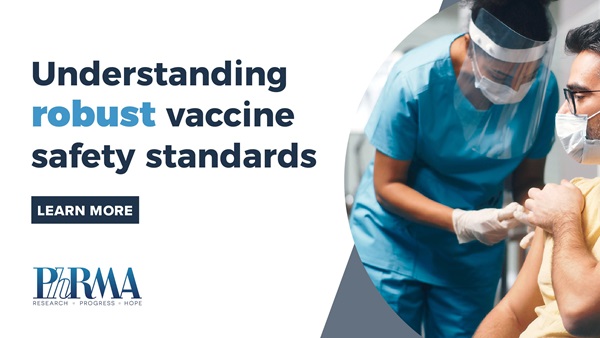As the world continues to feel the impact of the COVID-19 pandemic, the biopharmaceutical industry is continuing working around the clock to research, develop and manufacture vaccines to prevent infection. To date, substantial progress has been made in vaccinating Americans with COVID-19 vaccines that have been granted emergency use authorization (EUA) by the U.S. Food and Drug Administration (FDA).
Behind this progress are advances in technology and a deep understanding of both the basic biology and genetics of the virus and the nature of the immune response which has allowed us to rapidly respond to the current pandemic. While what has been accomplished to date has been a tremendous achievement, biopharmaceutical companies are not done fighting back against COVID-19. Across the industry, companies are urgently conducting additional preclinical and clinical research to address emerging variants and exploring additional treatments for those infected with the virus.
Further, it’s impossible to overstate the significance of collaborations. The unprecedented level of strategic collaborative efforts that have taken place across the biopharmaceutical ecosystem have been central to efforts to ensure efficient development, manufacture and distribution of critical COVID-19 vaccines and treatments while keeping the safety and well-being of patients as our top priority.
For COVID-19 vaccines, let’s take a closer look at how companies and the public sector are continuing to work together to help ensure patients’ health and well-being are protected:
- Robust clinical research standards: COVID-19 studies are subject to the same requirements, including safety monitoring, as all drug clinical trials. Researchers closely monitor data throughout the clinical trial and the FDA reviews these data as part of its assessment of the benefit/risk profile of the vaccine.
- Safety monitoring of COVID-19 vaccines continues after FDA emergency use authorization and approval: Once a vaccine candidate is authorized for emergency use or receives approval from the FDA, biopharmaceutical companies and the Agency continue monitoring product safety through surveillance and assessment of reported or observed adverse events. They also continue comprehensive manufacturing controls to help ensure ongoing product quality. Additionally, the Centers for Disease Control and Prevention’s (CDC) Immunization Safety Office “uses many strategies to assess vaccine safety, [including the Vaccine Adverse Event Reporting System] to identify health problems possibly related to vaccines, and to conduct studies that help determine whether a health problem is caused by a specific vaccine. CDC also works with other federal government agencies and other stakeholders to determine the appropriate public health response to vaccine safety concerns and to communicate the benefits and risks of vaccines.”
- Medical and public health experts provide outside scientific guidance: The Advisory Committee on Immunization Practices meets regularly to provide recommendations on vaccination use based on the latest scientific data. Further, the FDA has taken steps to ensure a robust vaccine candidate review process including by engaging the Vaccines & Related Biological Products Advisory Committee to discuss issues such as the development and potential authorizations of vaccines to prevent COVID-19 prior to any EUA.
- Genomic surveillance efforts: Public health officials and biopharmaceutical companies closely track variants using genomic surveillance to identify and decode changes in the COVID-19 virus’ genes and learn more about how these variants may impact vaccine efficacy. Biopharmaceutical companies are continuing to evaluate efficacy and investigate options that target the common viral strain as well as new variants.
It is important to remember that while an EUA is different than the FDA approval of a vaccine, safety standards for all COVID-19 vaccines are robust and no corners have been cut along the way. The FDA has issued guidance specifically on EUAs for COVID-19 vaccines that brings greater scientific transparency to the review process. America’s biopharmaceutical companies are supportive of the FDA’s efforts to date to facilitate the development of vaccines and have pledged ‘to make the safety and well-being of vaccinated individuals the top priority in development’ of these first vaccines. For more information about COVID-19 vaccine development, visit https://phrma.org/coronavirus





